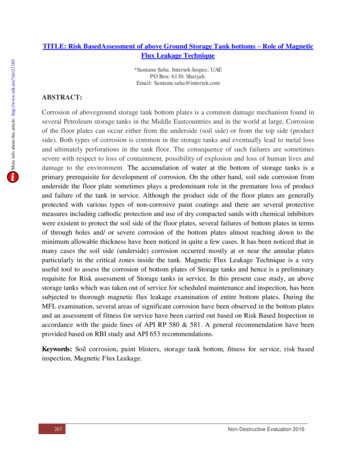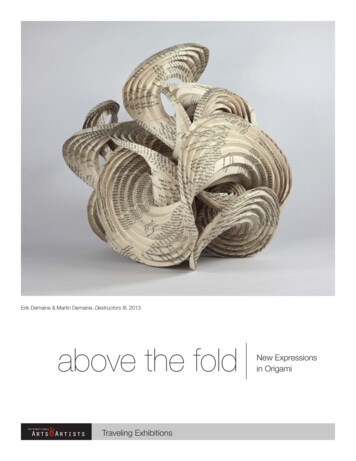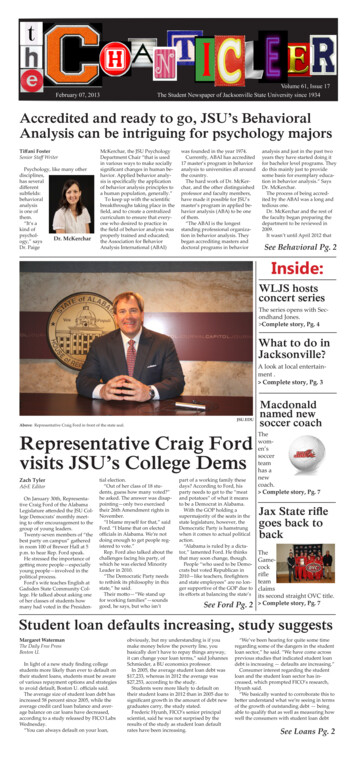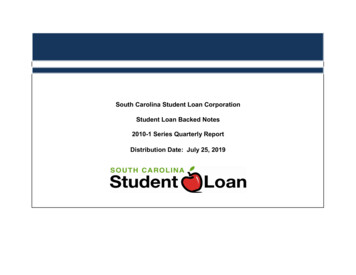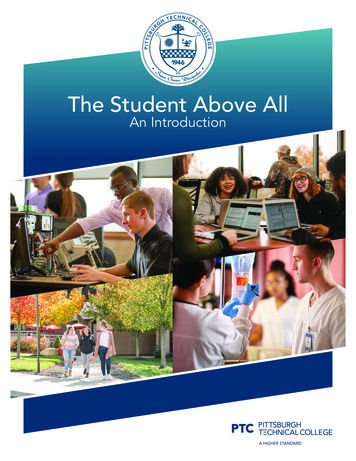
Transcription
The Student Above AllAn Introduction
An IntroductionPittsburgh Technical College (PTC) is located southwest of Pittsburgh, Pennsylvania,on a scenic 180- acre campus with student housing, a six-floor education building,and a comprehensive Energy Technology Center. PTC opened its doors in 1946when it began the School of Management Engineering. Today, PTC offers more than30 areas of study both on campus and online, including bachelor’s, associate, andcertificate programs that combine comprehensive general studies with dynamichands-on, career-focused education. PTC is set apart by its unique and innovativedelivery of high-demand academic programs, along with an explicit focus onstudent outcomes and placement. This commitment to effective education andreal-world preparation of students is demonstrated in our remarkable placementrates—96% of PTC’s 2019 graduates are working full-time, part-time, or freelancein their field. The College provides the education and support to get students inand out, and into a career they love.*Evolution is afoot at PTC, and the College is defining a new path forward. In2017, PTC completed transition to a nonprofit institution—a change which hadbeen part of our strategic plan for years. Not only does this financial structurelower institutional costs and secure the long-term viability of the College, butit also opens opportunities for new partnerships with foundations and otherstakeholders to increase our impact and better serve the Pittsburgh area. Themomentum behind this transition to a nonprofit educational institution has led toa wave of other recent changes and successes. A new president—PTC appointed Alicia B. Harvey-Smith, Ph.D., as its newpresident effective July 1, 2019. Dr. Harvey-Smith is a scholar-practitioner with 30years of experience in leadership, strategic planning, enrollment management,government and corporate partnerships, and student achievement.Dr. Harvey-Smith was the unanimous choice of the College’s Presidential SearchCommittee and Board of Trustees. Federal grant success—The National Science Foundation’s (NSF) AdvancedTechnical Education program awarded PTC a 297,000 grant to launch anintegrated software and machine lab instruction (ISMI) program in partnershipwith the local Montour High School. The three-year grant program, whichA scenic 180- acre campus with student housing,a six-floor education building, and a newEnergy Technology Center.2
took effect July 1, 2019, will be used to developcourses and extracurricular programming for PTCstudents and Montour upperclassmen interestedin careers in architectural and mechanicalengineering technology. Through the manufacturinglab at Montour, students will receive hands-on,project-based learning opportunities to work withessential and emerging concepts, software, andequipment. Coursework resulting from the ISMIprogram is expected to begin in Spring 2020 withplans to expand into other secondary schools. Accolades and recognition—PTC was selected as afinalist for Pittsburgh Technology Council’s 2020 CEOof the Year and 2019 Culture Leader of the Year Tech50 awards. Each year, the Council’s Tech 50 awardsshowcase leaders in technical advancement in thePittsburgh region. New facilities—In Fall 2019, ourSchool of Information Systems andTechnology opened the Jarrod T.Mochnick Center for Cybersecurity.Supported through the philanthropicgenerosity of the AIRES Corporation,the Jarrod Mochnick Center forCybersecurity will serve as thecomputersciencesspecializedlearning hub on campus, boastingthe latest technological upgrades such as a pod-stylelearning environment and cutting-edge forensic systemsequipment. This new facility is the most recent additionto our constantly evolving campus, which was expandedin 2013 with a new 15,392-square-foot Energy TechCenter. This Center helps to meet the growing needsfor skilled workers by providing students in our weldingtechnology and HVAC technology programs with aA HIGHERSTANDARDAHIGHERSTANDARDstate-of-the-art, hands-on work environment that’s asreal-world as it gets. This facility serves as our hub forinnovation in workforce development. Alumni engagement—We realize that moving forwardas a non-profit educational institution and bolsteringsupport from our wide network of alumni will becrucial to success. That’s why we’ve recently launcheda new alumni engagement initiative designed to helpour graduates “reclaim” their institution. A first stepin this initiative was development of Alma Mattersnewsletter, the first issue of which was distributedelectronically to alumni in Spring 2019. The newsletterhighlights annual alumni engagement activities suchas the “Scholarship Scramble” golf tournament, ourhomecoming - Alumni Oktoberfest, and the newestaddition to the PTC alumni calendar—a baseball outingat the Pittsburgh Pirates stadium. Looking forward,Dr. Harvey-Smith’s historic inauguration in 2020will serve as the launch for other important alumniengagement activities, including the induction of theinaugural class into the PTC Alumni hall of fame. Strategic Visioning—Dr. Harvey-Smith has initiatedand engaged an internal strategic plan committee thatalong with our Board of Trustees, has crafted the futurefor our college and reinvigorated our vision, mission,and commitment to our entire campus community.To learn more about the Pittsburgh Technical Collegestrategic plan please visit https://president.ptcollege.edu/.3
Our Academic Programs and Student SupportsIn 1946, Pittsburgh Technical Institute opened with the School of ManagementEngineering. In the 1960s, the drafting program (now Computer AidedDrafting) was introduced—among the first in the nation. In 1991, the GraphicDesign Program was added. Thereafter, PTI’s growth continued with additionalprograms in Business Administration, Computer Systems Specialist, ComputerProgramming, Multimedia Technologies, Marketing and Sales, AccountingAdministration, Medical Office Administration, Medical Assisting, concentrationsin Network Administration, Network Security & Computer Forensics, Safety &Security, and Surgical Technology. Electronics Engineering Technology wasadded to PTI’s offerings when Penn Technical Institute joined with PTI in 1996.Travel and Tourism was added in 1998 when PTI acquired the Wilma Boyd CareerSchool, which later developed Restaurant Management as well as Hotel andCasino concentrations. In 2010, PTI was approved to offer online programs anda certificate in Practical Nursing, and in 2013 added Culinary Arts, Welding, andan Industrial Instrumentation concentration to the existing electronics program.In July 2016, PTI became Pittsburgh Technical College, and for nearly two decadeshas been accredited by the Middle States Commission on Higher Education(MSCHE). PTC today offers bachelor’s, associate, and certificate programsdegrees in over 30 academic programs on campus and online. Housed within10 different schools, our programs are offered in fields in which there is demandfor new graduates—and we adjust our offerings as market conditions change.The curriculum is developed under the guidance of industry advisory boards anddesigned to meet the current needs of employers by following industry trendsand technologies. Class sizes are designed to be intimate with an average of16 students.100% of degree seeking students completeinternships, clinical rotations, or capstone projectsbefore they graduate.*4
Table 1: Summary of Pittsburgh Technical College Academic ProgramsSchool Program(s)Business Applied Management, Online (B.S.)Business Administration (A.S. and B.S.)Business Administration, Online (A.S. and B.S.)Criminal Justice Criminal Justice (A.S.)Culinary Arts Baking and Pastry (Certificate)Culinary Arts (Certificate and A.S.)Design and Engineering Computer Aided Drafting (A.S.)Technology Graphic Design (A.S.)Multimedia Technologies, Video Production (A.S.)Multimedia Technologies, Web Design and Development (A.S.)Energy and Electronics Electronics Engineering Technology (A.S.)Technology Electronics Engineering Technology, Industrial Instrumentation (A.S.)Smart Building Technology (A.S.)Healthcare Medical Assisting (A.S.)Medical Office Administration, Online (A.S.)Surgical Technology (A.S.)Medical Coding, Online (Certificate)Therapeutic Massage Practitioner (Certificate)Hospitality Hospitality Management Administration (A.S.)Information Systems Information Systems and Technology (B.S.)and Technology Information Technology (A.S.)Computer Programming (A.S.)Nursing Nursing (A.S.)LPN to ASN Track (A.S.)Practical Nursing (Certificate)Trades Technology Electrician Technology (Certificate)HVAC Technology (Certificate and A.S.)Welding Technology (Certificate and A.S.)A HIGHER STANDARD5
More than 75% of our classesare taught by full-time facultySupporting these high-demand academic programs are approximately 300faculty and staff. More than 75% of our classes are taught by full-time faculty, andmany of those faculty bring with them a long history of professional experiencein the fields in which they’re teaching.* For more than 70 years, PTC’s facultyand staff have been singularly focused on each student’s academic and careerdevelopment, embracing the PTC philosophy of Student Above All. PTC focuseson student success through enhanced student activities beginning with their firstquarter on campus and continuing until their final days at PTC. For example, firstquarter students work in tandem with Career Services in the classroom, and thisclose partnership continues throughout their program as an essential part of thecurriculum. PTC’s Career Services Department assists in providing professionaldevelopment to create a seamless transition from student to productive, valuedemployee. They offer industry networking experiences, career fairs, interviewpreparation, and resume writing, all in preparation to assist students and alumniwith their job search. They also assist students in finding part-time employmentwhile completing their education to build upon their career goals. Central totheir mission is that 100% of on-campus degree-seeking students gain realworld experience in their field by spending their last quarter at PTC in a capstoneexperience such as an internship or clinical rotation.* It’s this kind of experiencethat gives our students a clear advantage over the competition and leads to joboffers before graduation. In fact, 68% of our students receive job offers from theircapstone sites.*Our commitment to a more holistic approach with each individual student is adriving force as to why an annual average of 96% of PTC’s 2019 available graduatesare working in-field either full-time, part-time, or in freelance positions.* Amongthe many services and assets in place to guarantee student success are tutoringand support services, new lab equipment and educational infrastructure, revisedcurriculum and new program development, scholarships, industry relationships,teaching-focused faculty, and an overall campus community environment wherestudents are supported, academically engaged, and personally challenged.PTC has and will continue to make significant investments in these areas thatpositively impact the student population. The overall student-centered cultureand core beliefs of PTC remain the foundation for decision-making and strategicthinking, and the philosophy is embedded in all layers of the institution. AlthoughPTC continues to thrive in an environment in which market conditions, politicalpressures, and economic burdens can derail an organization’s overall culture,the steadfast strength and dedication of the staff and faculty are evident in thediversity and success of our students.6
Our Student BodyIn the Fall of 2019, PTC had 1,744 students enrolled. Dr. Harvey-Smith has abold vision of doubling this enrollment in her first five years through increasedcorporate engagement and expanded marketing efforts to target internationalstudents. Historically, PTC has targeted two main groups of prospective students,each comprising 50% of our current enrollment—adult students and high schoolstudents. These students primarily reside in Southwest Pennsylvania, but alsonearby in the tri-state area in parts of Ohio and West Virginia and extendingto Central/Eastern Pennsylvania, Maryland, and Delaware. We use three mainmarketing channels to recruit new students: O ur high school recruiting team presents the PTC story to roughly 6,000 highschool classrooms each year, reaching over 100,000 prospective students andgenerating interest among 12,000 high school seniors. A comprehensive media plan drove over 50 million impressions across themost popular channels, including streaming video (e.g., YouTube and Hulu),streaming audio (e.g., Pandora and Spotify), paid and organic social mediaadvertising (e.g., Facebook, Instagram, SnapChat and Twitter), and paid andorganic search engine optimization (e.g., Google and Bing). A new website delivers a best-in-class mobile first and accessible experience andhas generated roughly 400,000 visitors and over 6,000 requests for information,campus visits, or applications over the past year.With respect to student demographics, approximately 51% of our students residein on-campus housing. Just under 60% have been Pell-eligible in each of the lastthree academic years.Demographic profile of the PTC student body - As of Fall 2019 1,744 students (92% full time) 237 undergraduatetransfer-in enrollment 74% of students are 24 and under;26% are 25 and over 56% male, 44% female 85% of students are from in-state while15% represent 20 other states Student race/ethnicity:0% American Indian1% Asian7% Black or African American1% Hispanic/Latinos0% Native Hawaiian54% White4% two or more races34% race/ethnicity unknown0% non-resident alienFaculty and Staff - As of Fall 2019 145 full-time, 51 part-time faculty 145 full-time staff*A HIGHER STANDARD* Source: PTC Human Resources, October 20197
Equally as impressive as the diversity of the PTC student body is their careersuccess. We are guiding our students to achieve professional success.Our graduates personify professionalism and career commitment. We’reproud that 96% of PTC’s 2019 available graduates are working in-field eitherfull-time, part-time, or freelance.* Several recent graduates have experiencednoteworthy success:Dennis Biber graduated in 2016from our Electronics Engineeringprogram. He began workingwith Uber pre-graduation as atest engineer, operating earlymodel autonomous vehicles ona test track. He quickly movedinto a software position andwas the first person to take thedriverless car on public roads—he missed his graduation to doso! Today, Dennis continueswith Uber, working on a team tocreate an automated fleet-widetesting framework to find anydefects in hardware for the fleetof autonomous vehicles that thecompany envisions.8Michael McGarvey’s career successhas elevated him to a Senior CloudService Delivery Manager forAmazon Web Services. Throughouthis career he participated in andprovided oversight during multipleenterprise account transitions,including full data center migrationsconsisting of more than 2,500servers, and developed andimplemented global server buildand decommission processes, usedby both Wintel & Unix/Linux teams,for a Fortune 100 client.Following his studies at PTC,Michael obtained his Bachelor’s ofScience in Information Technology(Franklin University) in 2013, andMasters of Business Administration(University of Florida) in 2015.Jamie McMillen (now Cashdollar)graduatedin2012fromMultimedia Technologies/Video3-D. She is a news photographerfor the Pittsburgh news WPXITV, bringing to life the localstories you see on the news.She covers the spectrum frombreaking news to investigativestories to weather, and if you livein the Pittsburgh area, you’veundoubtedly seen her work.
The Need for PTCMany of PTC’s flagship academic programs fall under the umbrella of STEMfields. PTC is near Pittsburgh, PA, which was recently cited as the third-bestmetro area in the U.S. for STEM professionals (McAnn, 2019). The College is inthe heart of the Tri-State Regional STEM Sector, the location for thousands ofhigh-technology businesses—including Apple, Google, and Intel—and whereover 100,000 technology professionals are employed. Pittsburgh is a global hubfor sophisticated manufacturing, engineering, and applied technologies andsystems. Thus, the area provides ample opportunities for PTC STEM graduates tofind employment in their fields without needing to relocate.Across Pennsylvania and the U.S., there is a growing need for workers in computerscience and engineering in particular. Labor experts contend that by 2025, thenation will be short more than 23 million associate-degree holders needed tomeet workforce demands (Hull, 2012; Matthews, 2012). The problem is twofold:employers anticipate a wave of retirements, and fewer skilled workers areapplying for open positions (ACCD, 2017). There is a projected increase of 30.7%in demand for software developers, 11.3% for computer user support specialists,and 8.6-8.8% for electrical and mechanical engineers.Pittsburgh, the state of Pennsylvania, and the entire country also confront apronounced shortage in skilled manufacturing workers. Indeed, the ManufacturingInstitute projects that employers across the country will be unable to fill up to twomillion skilled jobs through 2025 (Manufacturing Report, 2015). The need for theseworkers is especially pronounced in Pennsylvania, where retiring tradespeopleand a construction boom in the western part of the state mean growing needs forskilled labor. Our trades comprehensive, 15,392-square-foot Energy TechnologyCenter, completed in 2013, helps to meet that need by providing students in ourwelding technology, HVAC technology, and electrician technology programs witha state-of-the-art, hands-on work environment that’s as real-world as it gets. Thisfacility serves as our hub for innovation in workforce development. According tothe SMC Business Councils—an organization representing small manufacturersand businesses—manufacturing is the largest industry in Pennsylvania andaccounts for 13.6% of the gross state product (Anderson, 2013). In a 2010 report,the Pennsylvania Center for Advanced Manufacturing Careers (PCAMC) foundthat the number of jobs in precision machining and industrial maintenance hadincreased over the past decade while employment decreased in other sectors,and they anticipated rising demands for skilled manufacturing workers over thesubsequent decade (PCAMC, 2010).15,392-square-footEnergy Technology CenterA HIGHER STANDARD9
Recent trends have borne out that expectation. The Keystone Chapter of theAssociated Builders and Contractors estimates that Pennsylvania was already shortabout 90,000 workers in associated skill trades in 2017 (McGaw, 2017). Similarly,in 2017, executives from East Penn Manufacturing Company, located in BerksCounty, indicated that low unemployment and impending retirements made itdifficult to fill positions in industrial maintenance (McGaw, 2017). A report fromthe Allegheny Conference on Community Development estimated that the skilledworker shortage in the Pittsburgh area alone may reach 80,000 by 2025 (Snyder,2016). State and national demand for specific manufacturing positions filled byPTC graduates is expected to increase over the next eight years, as documentedin Table 2 (O*Net OnLine, n.d.). Perhaps most notably, the US will experiencea 16% increase and PA a 20% increase in demand for Computer NumericallyControlled (CNC) machine tool programmers.Table 2: Projected Employment for Different Manufacturing Jobs from 2016–2026Position Level2016Jobs2026Jobs%Change# of AnnualOpenings46,10048,400 5%4,2002,0902,230 7%20074,50081,100 9%7,2002,3102,540 10%23060,20066,600 11%7,200Pennsylvania1,9302,090 8%230Computer Numerically NationalControlled Machine Tool ProgrammersPennsylvania25,10029,200 16%3,1001,1401,360 19%140Mechanical Engine
Casino concentrations. In 2010, PTI was approved to offer online programs and a certificate in Practical Nursing, and in 2013 added Culinary Arts, Welding, and an Industrial Instrumentation concentration to the existing electronics program. In July 2016, PT






